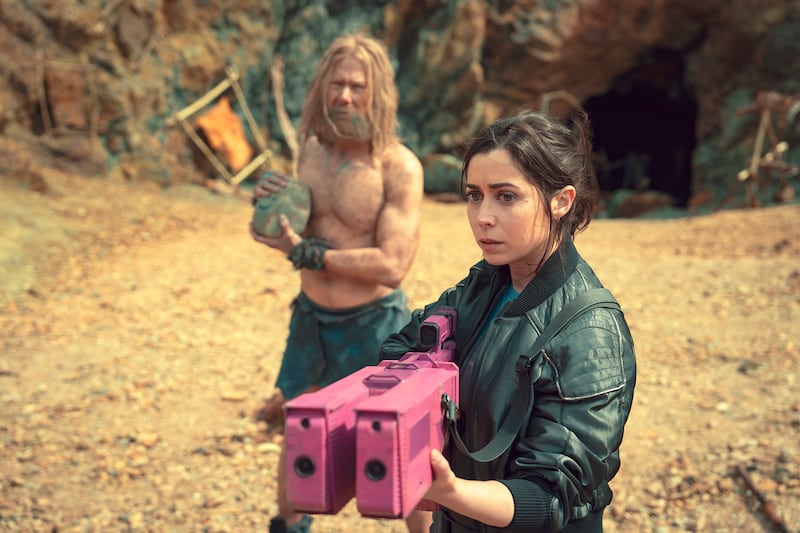Given the generally lackluster nature of its cautionary tales about technology, it will surprise few that Black Mirror is mostly underwhelming in its seventh season, with chapters ranging from the cute and semi-clever (“Common People”), to the sketchy and ho-hum (“Eulogy,” “Plaything,” “Bête Noire”), to the nonsensical and intolerable (“Hotel Reverie,” which stands as this run’s unqualified nadir).
Nonetheless, if Charlie Brooker’s satiric anthology, which launches April 10, once again predominantly elicits a shrug—along with occasional bouts of exasperated scoffing—it at least provides one highlight: USS Callister: Into Infinity, a feature-length follow-up to 2017’s Emmy-winning episode which, though a tad slight, inventively builds upon its predecessor as well as reconfirms, on the heels of The Penguin, that Cristin Milioti is a small-screen star. The series’ first sequel, it’s the sole reason to tune into this latest collection of near-future-fixated stories.
USS Callister was a Star Trek riff (inspired by The Twilight Zone’s classic “It’s a Good Life”) that aimed its blasters at toxic masculinity—not only the type peddled by old-school TV but, also, the sort of power-mad misogyny that manifests itself in gaming arenas.
The focus of its critique was Robert Daly (Jesse Plemons), a genius programmer and the mastermind behind Infinity, a massive multiplayer online game (MMO) that immersed consumers in a limitless sci-fi universe.

In secret, Daly had authored a private offline version of the title that was a replica of his favorite ‘60s television program, Star Fleet, which allowed him to serve as the captain of an intergalactic crew comprised of individuals who, it turned out, he’d created by cloning his coworkers. Daly did this because he wanted to punish the men and women who mocked, belittled, and exploited him in real life, using the game to act as a tyrannical god—a mission that was complicated when he introduced into the simulation his fetching new coworker Nanette (Milioti), who sparked a successful rebellion against her oppressor.
USS Callister: Into Infinity picks up with Nanette and her remaining compatriots—Nate (Osy Ikhile), Kabir (Paul G. Raymond), Elena (Milanka Brooks), and Karl (Billy Magnussen)—trying to survive the game as de facto rogue agents.
Lacking the player tags that adorn regular users’ avatars, and stealing credits to survive, they’re bugs in the machine, and their presence is brought to the attention of Callister CEO Walton (Jimmi Simpson), whose in-game clone fatally sacrificed himself for his friends at the conclusion of the original episode. Walton isn’t happy about this unauthorized glitch or the fact that a New York Times reporter is aware of it.

Fortunately, the real Nanette deduces what’s going on: Robert had used a DNA cloner to copy his colleagues into his game, and now they’re free in the MMO, running about as independent troublemakers whose (illegal) existence threatens the company.
As with so many Black Mirror efforts (including the aforementioned “Hotel Reverie”), USS Callister hinged on technology that was faintly realistic and yet operated according to magic fantasyland rules—such as the idea that Nanette and her crewmates were sentient and able to roam about even when Robert paused the game. USS Callister: Into Infinity features its fair share of similar just-go-with-it plot points, like the idea that online entities can actively communicate with their organic counterparts by telephone.
Still, it somewhat alleviates its precursor’s nagging illogicalities, largely by casting its protagonists into an expansive MMO galaxy that’s always on, active, and populated by players. On the whole, Brooker and director Toby Haynes (working from a script by Brooker, Bisha K. Ali, William Bridges, and Bekka Bowling) hit fewer logistical speedbumps, even as their story has its two worlds collide once the real Nanette and Walton enter the game and locate their cloned selves, the latter of whom has been discovered and rescued from an alien planet where he was living a Cast Away-style life with a sex rock named Rocky.

As before, USS Callister: Into Infinity is funnier and more upbeat than most Black Mirror affairs. Despite its pessimism about men’s sexist ugliness and people’s ability to change, it counters with a hopeful perspective on gaming—as a venue that allows us to be our best selves—as well as a positive outlook on redemption, atonement, and autonomy.
Additionally, it’s simply more entertaining than the majority of its anthology-mates, poking cheeky fun at science fiction and gaming tropes, and developing engaging and amusing personalities worthy of our rooting interest. Chief among them is Milioti’s Nanette, who in both iterations proves a selfless heroine dedicated to protecting those for whom she’s responsible. Faced, during the climax, with a choice between herself and her underlings, she comes to embody Star Fleet’s bold and compassionate spirit.

Milioti is the lynchpin of USS Callister: Into Infinity, with her charisma allowing the episode to power past its pesky contrivances. Brooker and Haynes never fully justify this return engagement; for long stretches, it feels like an adventure yarn that’s fixated on its own fiction rather than saying anything earth-shattering about our present reality.
Even so, its forward thrust is consistent and its production design remains spot-on, replicating the look and feel of Gene Roddenberry’s iconic show and capturing the helter-skelter kill-or-be-killed atmosphere of contemporary online realms. It also boasts an ace cameo from a familiar face as a character whose choices and urges suggest that, while evil is cultivated by external forces, it sprouts from a tiny seed buried deep within the heart and mind.
USS Callister: Into Infinity ultimately finds a way to shout out to a host of genre ancestors without losing its uniquely warped identity.
If its conclusion is, at a certain juncture, too telegraphed to astonish, it thrives on the backs of its performers, with Simpson doing witty double duty as villainous and valiant versions of Walton, and Milioti transforming Nanette into a charming figure of feminist empowerment. She makes Black Mirror’s seventh season finale a pleasurable voyage to infinity and beyond—and, in doing so, helps wash out the bad taste left by the series’ lame-to-lamer preceding installments.
The post The Only New ‘Black Mirror’ Episode Worth Watching appeared first on The Daily Beast.



















